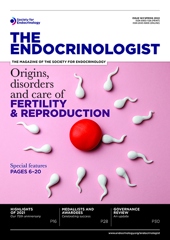Our Early Career Prize Lectures help early career scientists and clinicians have their work recognised across the wider endocrine community. Our 2021 Early Career Scientist Prize Lecturer presented at SfE BES 2021 in Edinburgh. Read on to learn more about their award-winning work. The application deadline for the 2022 Early Career Prize Lectures is 4 July 2022.
Understanding the mechanisms which regulate the formation of the human pancreas in utero has important implications for diagnostics, research and therapies.
Knowing which cellular pathways orchestrate pancreatic development can highlight genes which, when affected by DNA mutations, cause monogenic forms of diabetes (such as MODY (maturity-onset diabetes of the young) or neonatal diabetes1). Recent studies have shown the importance of genes involved in pancreatic development which increase the risk of type 2 diabetes,2 emphasising the value of an improved understanding in gaining insights into the pathogenesis of this disease. Finally, by accurately mapping the in vivo processes leading to development of the pancreas, we could inform current efforts to improve protocols to differentiate β cells in vitro, providing a better cellular model to study diabetes and potentially accelerating the introduction of cell-based therapies in this disease.3
LIMITATIONS OF RODENT MODELS
'Recent studies have shown the importance of genes involved in pancreatic development which increase the risk of type 2 diabetes, emphasising the value of an improved understanding in gaining insights into the pathogenesis of this disease.'
Traditionally, insights into human development have been extrapolated from studies in mouse models. These have been essential to highlight some of the master regulators of pancreatic development. However, there are many differences between the human and rodent pancreases. For example, (a) the structure of the islets of Langerhans is remarkably different (both in terms of cell composition and organisation), (b) mice have two genes encoding insulin whilst humans have one, and (c) heterozygous mutations in genes such as GATA6 result in pancreatic agenesis in humans but no phenotype in mice.4,5 These differences suggest that we can’t exclusively rely on animal models to understand human pancreas development.
STUDIES OF PANCREATIC AGENESIS
We aimed to discover novel regulators of human pancreatic development by studying the genetics of individuals with a rare genetic form of diabetes, called pancreatic agenesis. These individuals are born with a very small (or absent) pancreas, and develop diabetes in the first few weeks of life. They also have exocrine pancreatic insufficiency, which could affect their growth. Pancreatic agenesis is mostly caused by a single, rare, genetic mutation disrupting a gene essential for pancreatic development.6
We used whole exome sequencing (a technique which allowed us to sequence the protein-coding portion of the patients’ genomes) in two unrelated individuals diagnosed with pancreatic agenesis at 5 days. Both were born to parents who were related to one another. Our genomic analysis found that both individuals had homozygous variants resulting in loss of function of a gene called ZNF808.7 This gene had never been associated with human disease before. Analysis of the ZNF808 gene in 232 additional individuals with diabetes diagnosed in the first 6 months of life found homozygous mutations in 11 cases. All the individuals with ZNF808 mutations had diabetes diagnosed in the neonatal period and a very low birth weight, consistent with absent insulin secretion in utero. Five individuals were confirmed to have pancreatic agenesis; the remaining cases are being followed up. None of them had additional clinical features affecting other tissues.7

Figure. Genetic studies in individuals with rare diseases allows the identification of key regulators of human development.
UNDERSTANDING THE ROLE OF ZNF808
The protein coded for by ZNF808 belongs to the family of KRAB zinc finger transcription factors. This is an evolutionarily dynamic family of genes, binding and repressing transposable elements.8 Tracing the evolution of ZNF808 through species found that the corresponding protein is present only in higher primates and is absent in other primates and rodents.8 To the best of our knowledge, this is the first example of a primate-specific gene which causes a congenital developmental disorder in humans.7
We sought to investigate the role of ZNF808 during human pancreatic development using in vitro-differentiated stem cells. We used CRISPR-Cas9 to introduce a homozygous deletion of ZNF808 in human embryonic stem cells, and then differentiated them to pancreatic progenitors. ChIP-seq analysis showed that ZNF808 actively represses transposable elements during these early differentiation stages and, upon ZNF808 loss, many of these transposable element-derived regions become aberrantly activated.
Transcriptomic analysis showed that the biggest differences in terms of differentially expressed genes were observed at the primitive gut tube and posterior foregut stages. Among the genes which were overexpressed, there was an enrichment of liver genes with an enrichment of pancreas-related genes among the downregulated ones.7 These results led us to formulate the hypothesis that ZNF808 may have a role as ‘gatekeeper’ of cell fate early during pancreatic differentiation and be essential for liver versus pancreas fate decision. Under this model, absence of ZNF808 would result in cell fate diversion from pancreas to liver lineages, leading to pancreatic agenesis in individuals with ZNF808 loss of function mutations. Additional experiments are currently in progress to validate this hypothesis.
IN CONCLUSION
Our work highlights the power of using genomic studies in individuals with rare conditions to gain novel insights into human development. This study identified the first example of a primate-specific gene where loss of function mutations cause a human congenital developmental disorder. Furthermore, we have discovered a novel regulator of human pancreas development, providing a new avenue towards further understanding of how to replicate this process in vitro.
Elisa De Franco
Senior Research Fellow and Diabetes UK RD Lawrence Fellow, Institute of Biomedical and Clinical Sciences, College of Medicine and Health, University of Exeter
REFERENCES
- Hattersley AT & Patel KA 2017 Diabetologia 60 769–777.
- Geusz RJ et al. 2021 eLife 10 e59067.
- Balboa D et al. 2019 Diabetologia 62 1329–1336.
- Allen HL et al. 2011 Nature Genetics 44 20–22.
- Watt AJ et al. 2007 BMC Developmental Biology 7 37.
- De Franco E et al. 2019 American Journal of Human Genetics 104 985–989.
- De Franco E et al. 2021 medRχiv doi: 10.1101/2021.08.23.21262262.
- Imbeault M et al. 2017 Nature 543 550–554.







